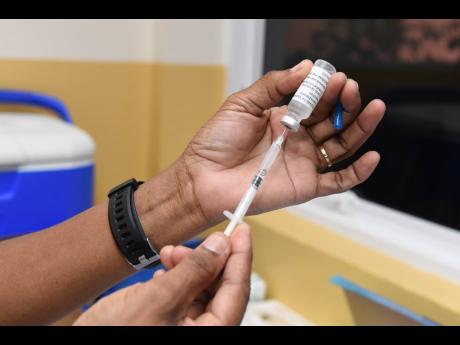WAIT AND SEE
Still no positive word on Ja vaccination status
WESTERN BUREAU:
Two weeks after discussions with the United Kingdom (UK) government on the acceptance of AstraZeneca vaccine codes not recognised by that European country, Jamaica is yet to see a change in status.
The island is among a group of countries gifted with COVISHIELD vaccines manufactured in India on behalf of the UK.
Minister of Health and Wellness Dr Christopher Tufton said he believes some progress was being made but acknowledged that he was not in a position to comment definitively on the final position.
He said further consultation was needed with Foreign Affairs Minister Kamina Johnson Smith for clarity.
“I’m sure she will provide information when an agreement of some kind is reached, and we’ll make it available to you. But talks are taking place,” he stated during a press briefing on Thursday afternoon.
Currently, fully vaccinated Jamaicans travelling to the UK are designated unvaccinated and are required to quarantine for 10 days upon arrival there.
Jamaica is not alone.
Ghanaian President Nana Akufo-Addo recently criticised First-World power brokers at the recently concluded United Nations General Assembly.
“The use of vaccines as a tool for immigration control will be a truly retrogressive step,” he argued.
In the case of Jamaica, the UK donated some 300,000 doses of AstraZeneca in July. Former High Commissioner Asif Ahmad tweeted on September 20 that the criteria being used by the UK for quarantine were not based on vaccine brands but other factors, ranging from supply and cold chain to certification.
“When enough is known and assessed about the programme, countries will be added to the UK list,” he stated in response to queries regarding the unrecognition of the vaccine code by his country.
In the meantime, Jamaica’s COVID-19 positivity rate is trending downwards, with Chief Medical Officer Dr Jacqueline Bisasor-McKenzie reporting that the peak of the surge would have fallen somewhere between the last week in August and the first week in September.
The trend is also favourable for bed capacity, as hospitalisations continue to fall.
“What it means is that it frees up the hospital to be able to manage other cases. Many other cases are waiting for surgeries, etc. It’s very important to keep this trend going down so that we can resume some of the normal activities within the hospital,” she stressed.
Bisasor-McKenzie credited a series of measures, including no-movement days, for driving down infections.
Meanwhile, at least three children were admitted to hospital for observation for 24 hours, while others experienced increased dizziness after taking the Pfizer vaccine, Dr Melody Ennis has confirmed.
Ennis, director of family health services with oversight of Jamaica’s vaccine programme, confirmed that there were more adverse reactions with Pfizer than other brands.
Jamaica has so far administered the AstraZeneca, Johnson & Johnson, and Pfizer within the last six months.
The dizziness occurred immediately after the jab at the vaccination sites. However, within 10-15 minutes after lying down, the youngsters were okay and allowed to leave the site, said Ennis.
“We have had no reports of any further adverse events following those episodes,” she told the media during the Ministry of Health & Wellness press briefing on Thursday afternoon.
She warned that it was important to contextualise adverse reactions to vaccines as normal, with complaints ranging from pain in the arm to flulike illness.
Ennis said that children will also have fainting or syncopal episodes.

